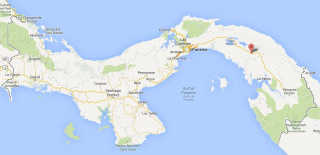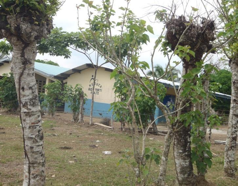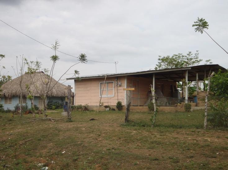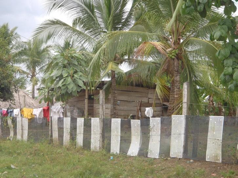Platanilla, Panama
![]()
![]()
![]()
![]()
![]()
![]()
![]() Click on Programs to learn more about their work in this community
Click on Programs to learn more about their work in this community
General Information

| Population* | 315 |
| Number of homes | 86 |
| Avg # of people per home | 6-7 |
| Electricity | Yes |
| Corregimiento | Rio Congo Arriba |
| District | Chepigana |
| Corresponding Health Center | Platanilla |
| Distance from compounds | 50 minutes |
| Road conditions | Poor: dirt road |
* Population does not reflect how many patients will be seen on medical
brigades as many people from surrounding communities come seeking
Medical Brigades medical attention.
|
Platanilla’s educational system includes kinder and primary schools (up to 9th grade). There are 8 teachers. Approximately 87% of the community can read and write. Community members have to travel 45 minutes (by car) to the nearest high school in Tortí.
|
 |
Platanilla has a water system which is composed of two gravity-based aqueduct systems. Water is available almost everyday of the week for a few hours at a time. It is chlorinated by an automatic drop system. Platanilla's water committee runs and maintains the system. It is estimated that 99% of the homes are connected to the system. Families connected must pay on average a $2 a month fee for the service; about 80% of those connected are paying the fee.
|
Platanilla has a centro de salud (health center) There is a full time doctor at the health center and sometimes a nurse. There is a health committee in the community. The most common illnesses amongst community members are intestinal parasites, diarrhea, high blood pressure, the common cold, and pelvic infections (in women). Approximately 10% of homes have flush toilets, 40% have pit latrines, 40% have composting latrines, and the remaining 10% lack bathroom facilities. Approximately 95% of households have gas stoves. About 50% have cement floors. Only 2% of families have water filters in their home.
|
 |
|
The majority of homes are made of block and wood. The main forms of employment are agriculture on privately owned land and raising livestock. The main agricultural products cultivated in the community are corn, rice, yam, yucca, beans, and plantains. Cattle, pigs, and chickens are raised for personal consumption. Community members who own land and seek agricultural loans have access to credit through the Savings and Loan Cooperative in Tortí. Certain community members also have access to service at the Banco Nacional. Approximately 50% of the community has access to credit and savings accounts (through Tortí and the Banco Nacional). Global Brigades is currently with Platanilla and IPACOOP to set up a community bank so that community members who do not have land titles can take out small loans. The community bank is called “Raíces de mi Tierra” and has legal status (personería juridica). Businesses in the area consist in small family businesses (two to five people), such as mini-supermarkets, fondas, and local bars. |
 |
There is a Peace Corps volunteer in Platanilla focused on environmental health projects. It is estimated that almost no one in the community recycles. Community members burn their trash as a form of waste management. Very few community members use organic fertilizers and/or pesticides. There is no environmental committee in the community.
There are no lawyers in the community, however there is access to legal services in Panama City, Panama, or La Palma, Darien. Both of these locations are at least 3 hours away in bus or car. About 30% of community members have land titles for their land.
The community follows the general administrative government structure of Panama. The community leaders meet often to discuss Platanilla-specific issues as well.
Peace Corps, MINSA, Pro-Niños, and ANATi
Medical/Dental, Business, Human Rights and Public Health are currently working in Platanilla.
Source of information: Key informant interview
Date of interview: April 30th, 2011
Last Visited: February 2, 2014
Last updated: February 28, 2014